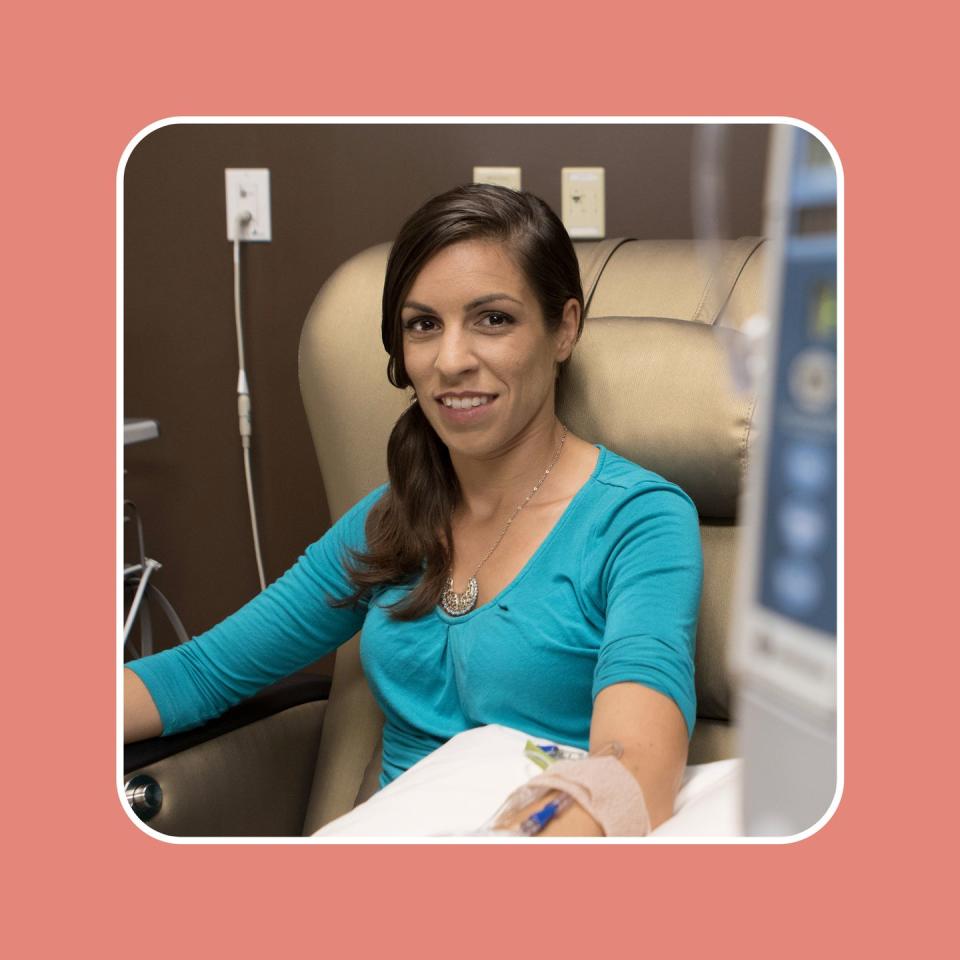How 4 Women With Ulcerative Colitis Cope With The Stress Of Their Condition

The challenges that come with living with ulcerative colitis—an inflammatory bowel disease—can be devastating. And worse, the pressures dealing with it can actually trigger its symptoms of diarrhea, abdominal pain, and cramping, according to Medline Plus.
People with ulcerative colitis typically require lifelong treatment, but learning to manage the stress can help lower the risk of flares. Of course, there’s a big difference between being told to de-stress and actually knowing how to do it. Here, four women share what they've learned about dealing with stress while living with ulcerative colitis.
“Get ahead of your stress.”
Megan Starshak, 36, has been dealing with ulcerative colitis since 2002, getting regular IV infusions of a biologic (an infusion treatment that contains sugars and proteins or living organisms) to keep her symptoms under control. But she's well aware there will sometimes be bad days where she may have up to five bowel movements. "After a super stressful day, I'll notice that I have more pain and looser stools," she says.

Once, before an important presentation, she got incredibly sick and found herself wondering if she should go to the presentation or the hospital. Fortunately, a friend stepped in, telling her, "Whatever happens, your life is going to go forward"—and that her health was more important than her work obligation. "That’s a moment I've kept with me," she says. "I’ve learned to let go of things that really don’t matter in the long run."
Starshak says she now tries to plan better when she knows there's a stressful week ahead. "Don't wait until you’re in the middle of it to recognize your stress is high," she says. "Getting ahead of it is crucial." She recommends any version of stress management that works for you, such as yoga or taking a walk.
“Forgive your body.”
Tovah Bleakney is a mom to three young boys, and she says her ulcerative colitis symptoms can make it difficult to juggle the demands of parenting. During a flare, "I have extreme fatigue, joint pain…I'm in and out of the bathroom all day, leaving my toddlers with very little time with their normally very energetic mama," she says.

Between juggling work and home life, Bleakney, 38, says that she's "constantly second guessing" what she can handle. "On the days I can’t give 100%, I feel like a complete failure," she says.
But Bleakney has learned that changing her mindset can help. "I continuously remind myself that I have no control over this," she says. "I do, however, have control over how I treat myself and the grace and forgiveness I give myself and my body on those days." Bleakney has also started posting daily affirmations and motivations on Instagram. "I can remind myself and people around me to be kind and work on loving yourself," she says.
“You might as well laugh!”
It's been almost a decade since Mary Elizabeth Ulliman was diagnosed with the disease, and she's learned to always be prepared. "The first thing I do when I go anywhere is figure out where the bathroom is," the 33-year-old says. "I tend to plan ahead and ensure I know the schedule, locations, and food plan. I’ll pack my own food, if necessary, and have grown accustomed to always having at least a few safe snacks on hand just in case."

On top of that, Ulliman keeps an extra pair of underwear in her desk at work and in her car, in case of accidents with unexpected bowel movements. "I also always tell myself, if you don't laugh you'll cry, so you might as well laugh," she says. "After all, poop will always be funny—I don't care how old you are."
“There’s no giving up.”
Josephine Puccia has struggled with such serious symptoms—including extreme fatigue, diarrhea, and malnourishment—since she was diagnosed two years ago that she felt she needed to quit her job at a health clinic. The 28-year-old mom says she's had to hold off on major dreams—including going back to school to become a medical technician and having more children—because of flares. She's even had to delay plans for an intimate wedding because her condition was so bad.

"Most days I can’t get out of bed or off the toilet," Puccia says of the condition that often leaves her physically and mentally drained. "My symptoms can just go from manageable to intolerable from one day to the next. But I've come to terms with the fact that this disease is with me for life, so it's time to learn how to live with it the best way I can."
Puccia says she's focused on finding a treatment that works. "I’m simply seeing what my body can tolerate," she says. "There's no giving up because I have a little girl looking up to me that needs me more than anyone else in this world."
After dealing with significant hair loss due to her disease, she made a bold move . "I finally had the courage to just chop it off and take it as a fresh start on my journey to remission and good health," she says. "Instead of ulcerative colitis controlling me, I'm controlling ulcerative colitis now."
You Might Also Like